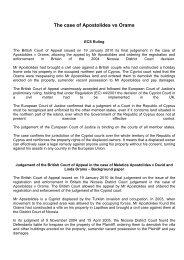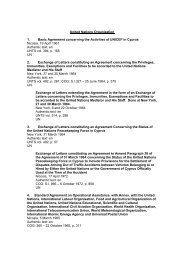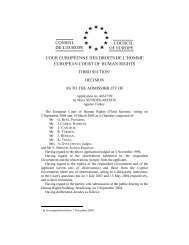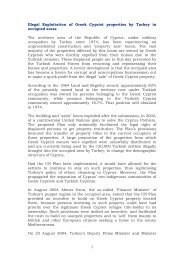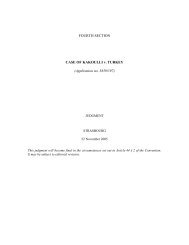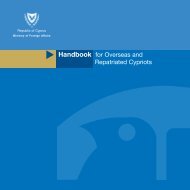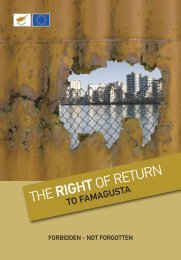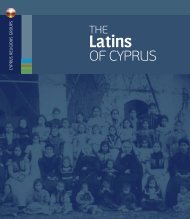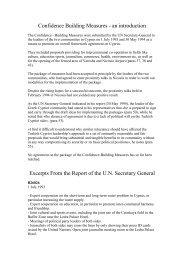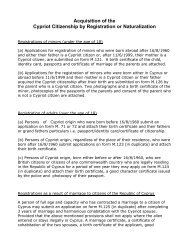European Court of Human Rights Case of Loizidou v. Turkey
European Court of Human Rights Case of Loizidou v. Turkey
European Court of Human Rights Case of Loizidou v. Turkey
You also want an ePaper? Increase the reach of your titles
YUMPU automatically turns print PDFs into web optimized ePapers that Google loves.
settled by application <strong>of</strong> a Convention provision which was never intended to solve problems on this<br />
scale.<br />
I agree entirely with Judge Morenilla’s statement in his dissenting opinion that “the majority has<br />
unrealistically disregarded the general political situation <strong>of</strong> the region where the applicant has property<br />
when examining her claim for pecuniary damage for the loss <strong>of</strong> use <strong>of</strong> the land and the consequent loss<br />
<strong>of</strong> opportunity to develop or lease it during the past eight years, and when making an equitable<br />
assessment <strong>of</strong> this (paragraphs 33 and 34 <strong>of</strong> this judgment).”<br />
4. Lastly, as I observed above, by intervening in this case, that is by bringing it before the <strong>Court</strong>, the<br />
Greek Cypriot administration has completely altered the nature <strong>of</strong> the case for Convention purposes. It<br />
has become an interstate case. In spite <strong>of</strong> its deceptive appearance, the judicial and legal stage in this<br />
case is occupied by the representatives <strong>of</strong> the Greek Cypriot administration. As the <strong>Court</strong> has itself<br />
accepted in inter-state cases, the parties must themselves bear the costs and expenses they occur in such<br />
proceedings. The applicant should not therefore be awarded costs. In the alternative, I would say, in<br />
agreement with Judge Morenilla in his dissenting opinion, that in the present case it was not necessary<br />
“for the applicant to have been represented before the Commission and the <strong>Court</strong> by two Cypriot<br />
lawyers and a foreign international law specialist, since … one lawyer would have sufficed to deal<br />
properly with the legal issues involved in this case”.<br />
DISSENTING OPINION OF JUDGE pettIti<br />
(Provisional translation)<br />
I voted with the minority against the decisions set out in point 1 <strong>of</strong> the operative provisions (the<br />
principle) and in points 2 to 5 awarding various sums to Mrs <strong>Loizidou</strong>.<br />
This was necessary so that I could remain consistent with my votes and dissenting opinions in the first<br />
two <strong>Loizidou</strong> judgments, particularly as the present judgment again refers, as regards international law,<br />
to the first judgment. My votes in the first two judgments were prompted by the political situation in<br />
Cyprus and my interpretation <strong>of</strong> international law. The fact that an international force controls the<br />
“green line” and prohibits the free movement <strong>of</strong> persons from one zone to the other and access to<br />
property in another zone should in my opinion have been taken into account by the <strong>Court</strong>. Current<br />
political developments show that the problem <strong>of</strong> Cyprus unfortunately goes well beyond the<br />
dimensions <strong>of</strong> a mere lawsuit.<br />
1. This summary by the registry does not bind the <strong>Court</strong>.<br />
2. Rules <strong>of</strong> <strong>Court</strong> A apply to all cases referred to the <strong>Court</strong> before the entry into force <strong>of</strong> Protocol No. 9<br />
(1 October 1994) and thereafter only to cases concerning States not bound by that Protocol. They<br />
correspond to the Rules that came into force on 1 January 1983, as amended several times<br />
subsequently.





